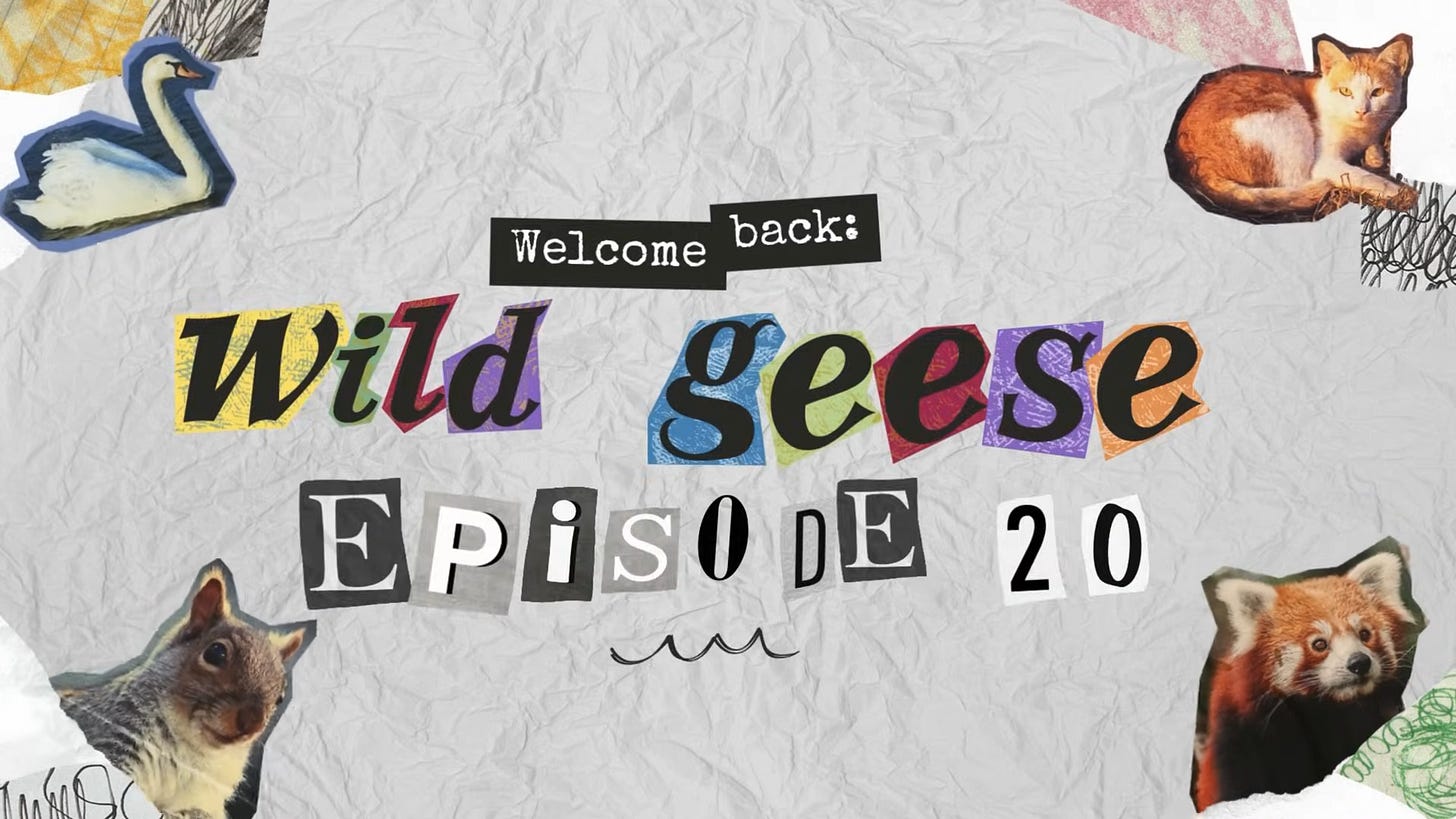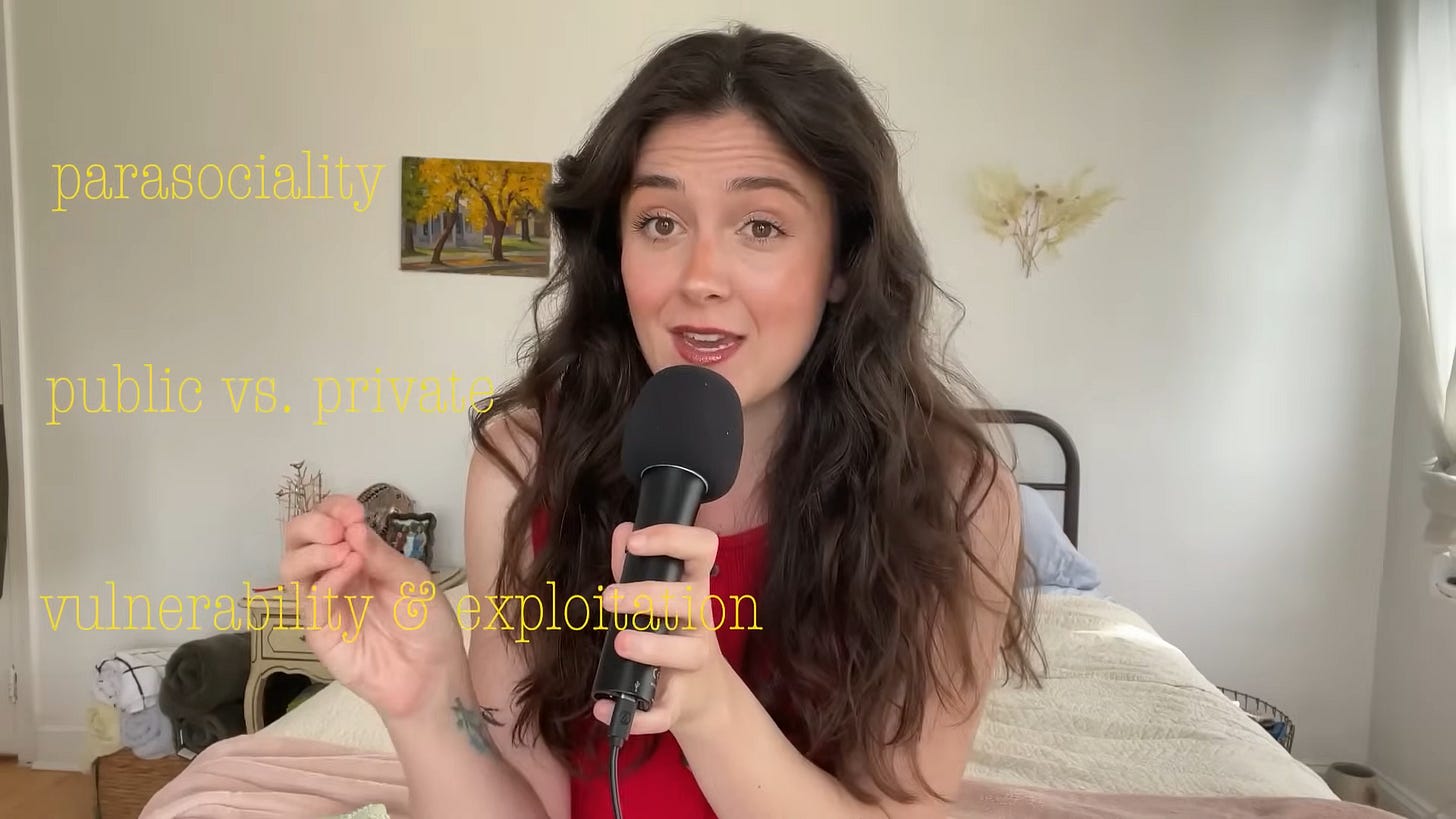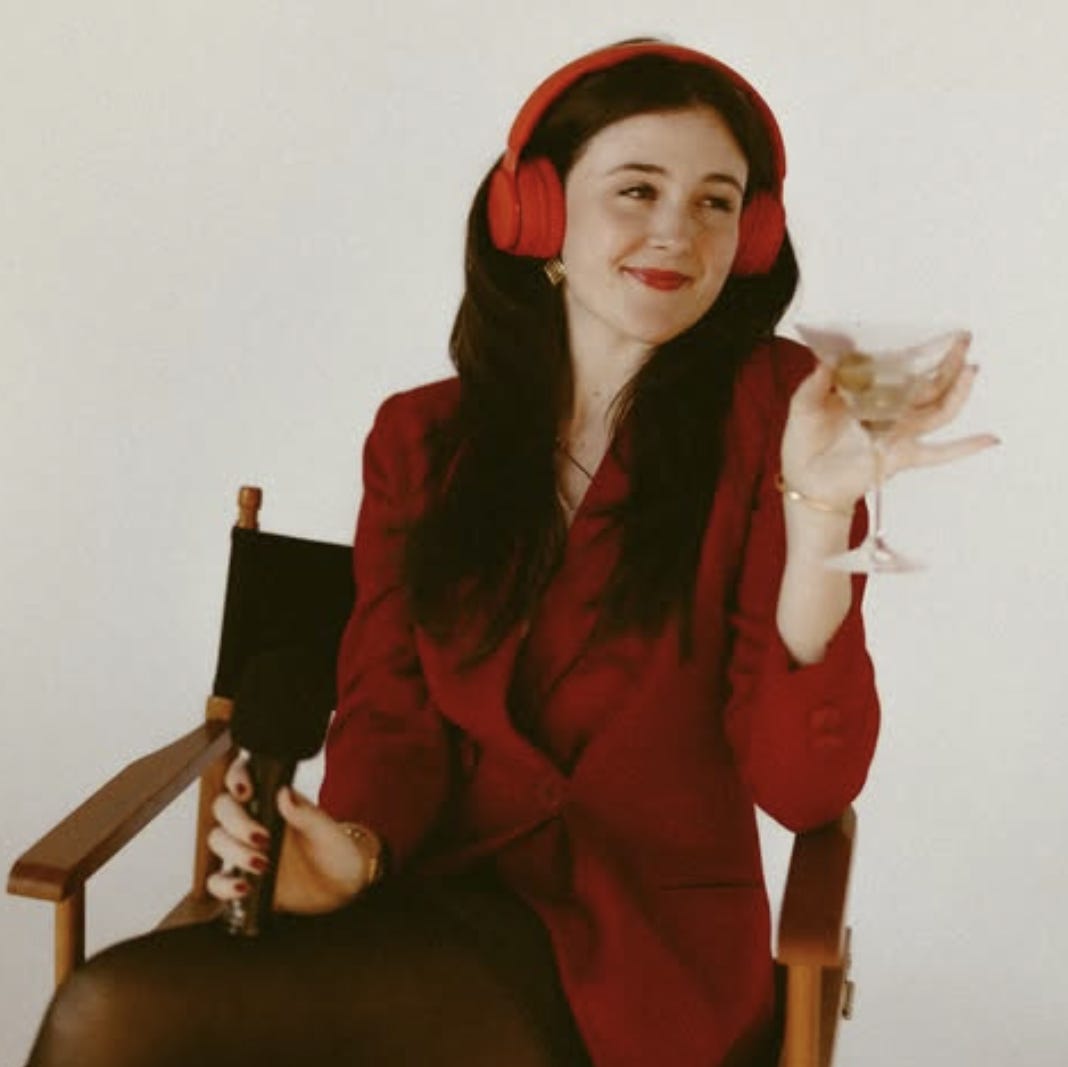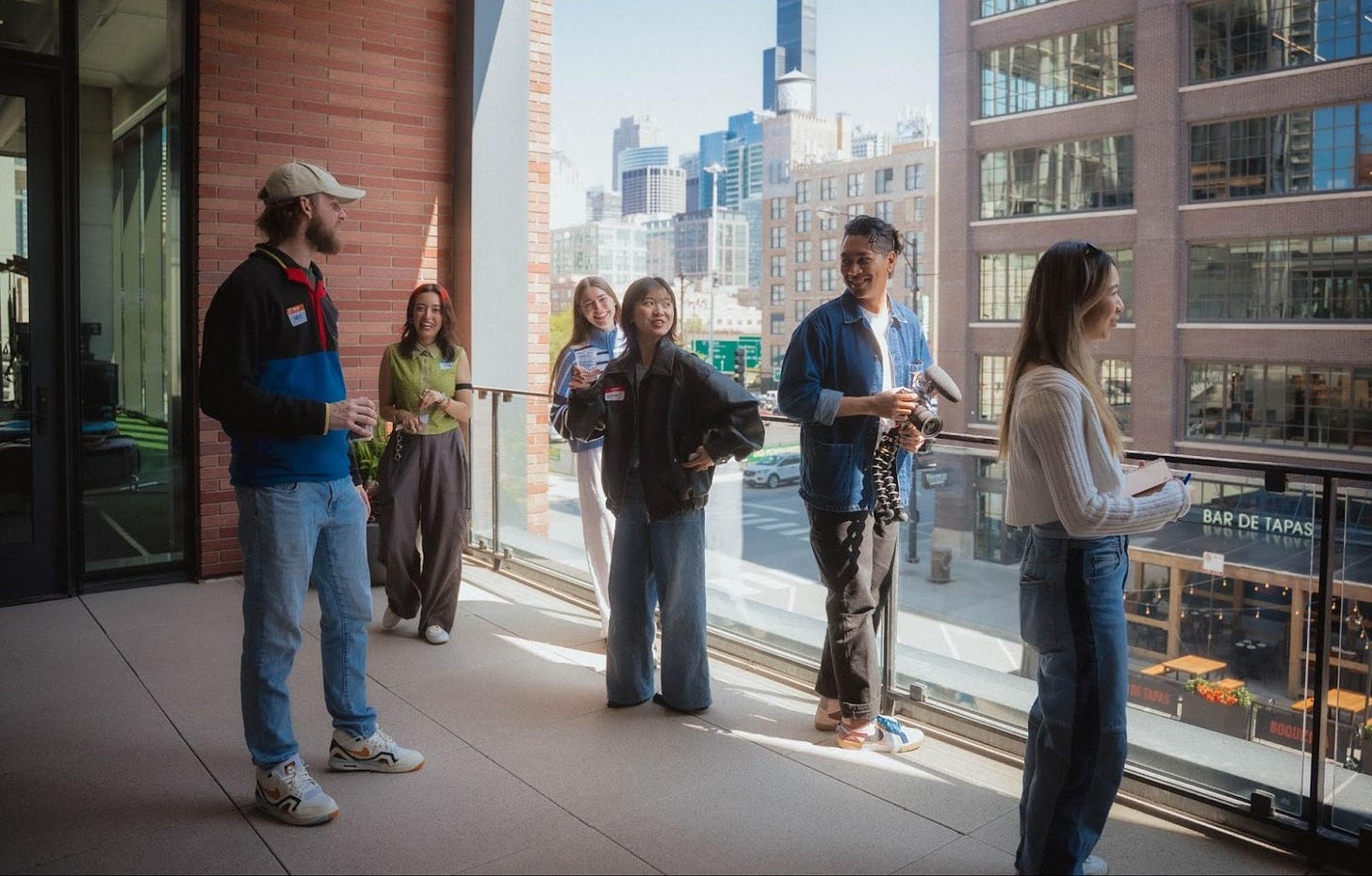Wild Geese & Where to Find Them 🪿
Plus: We have an intern now?!
blog.sixty-eight // It’s been a week since we talked about bunch of friends (and their ridiculously-wholesome vlogs) for our second Neighborhood Watch review.
ICYMI, here’s what else is going on in our creative neighborhood…
Only three days to go until the new season of Creator Mag premieres on our YouTube channel! Subscribe to make sure you don’t miss it (:
Tomorrow, we’re hosting an evening of board games and charcuterie boards at the studio. It’s free to attend—RSVP here.
A new flash review section, “Judd’s Corner,” will briefly spotlight two videos every Thursday. It’s curated by our intern (me!).
And, most importantly, our third installment of Neighborhood Watch was written by the one and only Moy Zhong. Scroll down to read it!
— Judd Karn
P.S. Last blog, we debated the merits of building a website in the year 2025—and shared a Letter to the Editor. You can read it here.
Sponsored by Fourthwall
We’re Building a Creative Neighborhood...and You’re Invited 🏘️
When we talk about what we do, that’s our metaphor of choice. Because the gatherings we host—and, in turn, the stories we tell—should feel like a block party.
Where the size of your house doesn’t matter as much as showing up, bringing a fresh-cooked meal only you could make.
Building our neighborhood intentionally is a long-term commitment, requiring constant communication with readers, customers, and paying members alike. That’s why we run ours on Fourthwall.
With Fourthwall, you maintain control over your customer email lists and website analytics…even as social media platforms constantly tweak their algorithms and community guidelines.
Grow your brand on your terms. Launch your online store (for free) on Fourthwall today.
Video: ‘How to Be An Artist Without Selling Your Soul on the Internet’ (2025)
Creator: Anna Howard
Review by: Moy Zhong
I think I think too much about everything I’m doing and if it’s in response to something I’ve seen online—or how it would be perceived there.
I’m still coming to terms with digital personas, and I mourn the time when I was more carefree. When I logged on, when I was more creative, when I wasn’t so burnt out from living life…and hyper-analyzing how I can revive the feeling of simpler times.
Anna Corrine (real name: Anna Howard) hosts the podcast Wild Geese. In twenty-to-forty-five minute segments, she explores—and quells—these types of thoughts with an earnest voice our Internet neighborhood has sorely, sorely been needing. The online creatives seeking a life raft amongst the noise, the people who overthink the Internet because they know how the sausage is made…this one’s for you.

The recommended feed first introduced me to her video “creating a digital garden to end my doomscrolling.” Anna is a freelance podcast producer; she’s been around this block before, and finally took a stab at creating her own show in 2025. She covers and acknowledges the intersection of the Internet and the real world that I feel many creators ignore in discussions about mindful living in the digital age.
Anna won’t just tell you to “touch grass,” nor plead mantras of “consume less, create more.” Wild Geese feels more like discussions with a friend in the park, one where Anna brings Tumblr memes, prose, and lots of Substack reading material to the table—connecting them to central themes around moving forward in a thoughtful, meaningful way, step-by-step.*
Thus far, my favorite episode has been “How to Be An Artist Without Selling Your Soul on the Internet.” That’s something I think about too much. I’ve suffered the consequences of holding myself back from making much art because of it.

She begins by addressing a quote by playwright Mark Ravenhill: “To be a good artist, you have to be the most truthful person in the room.” Accurate, but difficult when that room is the worldwide web. In a space so big, it’s a slippery slope for what information you keep private or public, and what information you exploit.
From there, Anna explores this through the experience of sharing personal confessional writing on her Substack…and launching it only after first blocking her family and everyone she knows in real life from reading it (real!). Which begs the question: Why might it feel easier to express your Internet self to thousands of strangers and not the people closest to you?
Why must the Internet feel so embarrassing?
And to what extent can you be vulnerable, without being exploitative of your own personal experiences as an artist?
“To be a good artist, you have to be the most truthful person in the room.” —Mark Ravenhill, playwright
I also appreciate Anna’s approach to Internet identity as a woman, too, especially when it feels like many of the creator-sphere analysts lean a bit too Silicon Valley business bro for my taste. She credits lots of women writers, theorists, and artists.
Yet in “How to Be An Artist…” Anna addresses all of the research I praised her for as part of “expertise anxiety,” which is experienced by many women. “I read so much from other people partly because, ‘what do I have to say? I’m not an expert on anything,’” Anna shares in Wild Geese. “[But] no, I’m giving myself the gift of a deeper expertise and a deeper connection with women artists and women authors through what I’m making. And that’s a really beautiful, rewarding thing for me.”
There are a lot of podcasts you can spend your time with these days. The chattiest, conversation-leaning ones top the charts; creators talk about themselves in hopes you, the listener, bond and root for them, and maybe you’ll take some interesting insights by cheering them on.
On the other end, the well-researched, in-depth, journalistic ones (think those from the likes of NPR, The New York Times, and Vox) implore you to care about the world, to make life changes that can benefit yourself and society.

Wild Geese is somewhere in the middle, but it feels like Anna is rooting for you. Sharing tidbits of her life not as self-serving stories, but explicit invites for listeners to reflect on their own. In doing so, she’s cheering on creative people, a belief that we can all build healthier creative digital neighborhoods.
Nate, Shua, and those in the #writers-room channel of our Slack will find Anna’s face and name frequently — I’ve shared a lot of her videos there.** Anna and her community, to me, are living proof that things like Creator Mag are worthy of existing.
Critically thought-about media isn’t dead. Our online and real lives are inextricably intertwined from now until the end of the Internet—and the conversations Anna brings to Wild Geese are a step towards learning how we take care of this thing.
Hi! I’m Judd, the new intern here at Creator Mag. I’m also a current college student majoring in something called “Modern Culture & Media.”
What does that mean? Mainly that I watch far too much YouTube.
The bad news: Yes, it is scary to check my screentime and see how many hours I spent on YouTube this week (twenty-five). The good news: I get to share my favorite snippets of various rabbit holes that I venture into with all you wonderful people.
Every Thursday, I’ll bring you a fresh edition of Judd’s Corner in the form of two mini-reviews. Speaking of which…
‘Strangers Ease My Soul-Crushing Battle With Anxiety’ (2025)
Creator: Tilek All Better
An extraordinarily apt embodiment of Gen Z sentiment—especially in recent times—this video blurs the lines between scripted and unscripted.
Tilek narrates a caricaturized version of his life, turning the story into an absurdist pastiche of itself (and street interviews like it). In an effort to prevent being fired from his dead-end job for “reeking of fear [and anxiety],” he roams the streets of Manhattan, asking real residents of the city how he can be rid of his anxiety and get back to work.
The true magic of the creator’s STREET THERAPY series is his ability to juggle pure human interactions and a layer of comedy. Through scripted narration and amusing editing, that balance acts as a cushion for serious topics around mental health. Simultaneously, Tilek manages to create a half-hour comedy special and introspective meditation, filled with self-deprecating humor and insightful storytelling.
Judd’s Score: 4.5/5
‘Stop chasing original ideas—here’s what actually makes you creative’ (2025)
Creator: Lofi Cinema
As an aspiring creator, I often wonder why I am fit to create and display my work to the world. What makes my story unlike the billions that have already been told?
This video by Lofi Cinema finally resolved that lingering question for me. We reinvigorate past conventions and narratives with our own experiences—and create something completely novel.
Judd’s Score: 4/5
Thanks for reading! Shoot us a reply, comment, or DM if anything resonated with you in particular—we respond to them all.
* The name “Wild Geese” comes from a poem by Mary Oliver, which Anna also explains in her first Substack post (yes, the one that was first kept private).
** Fun fact! To pull back the curtain a bit, the episode “how to fall down a curiosity rabbit hole & reconnect to your creativity” almost inspired a completely different weekly series, before we settled on “Neighborhood Watch.”
That video is all about how no one’s a flaneur of the Internet anymore, and we feel stagnant because of it. Listless exploration of the Internet is a hallmark of its “good ‘ole days,” and we should become curious again instead of asking Grok or Gemini how to live life. Another top-tier episode, in my opinion.














Thank you so much, this was a really great surprise & a pleasure to read today!!